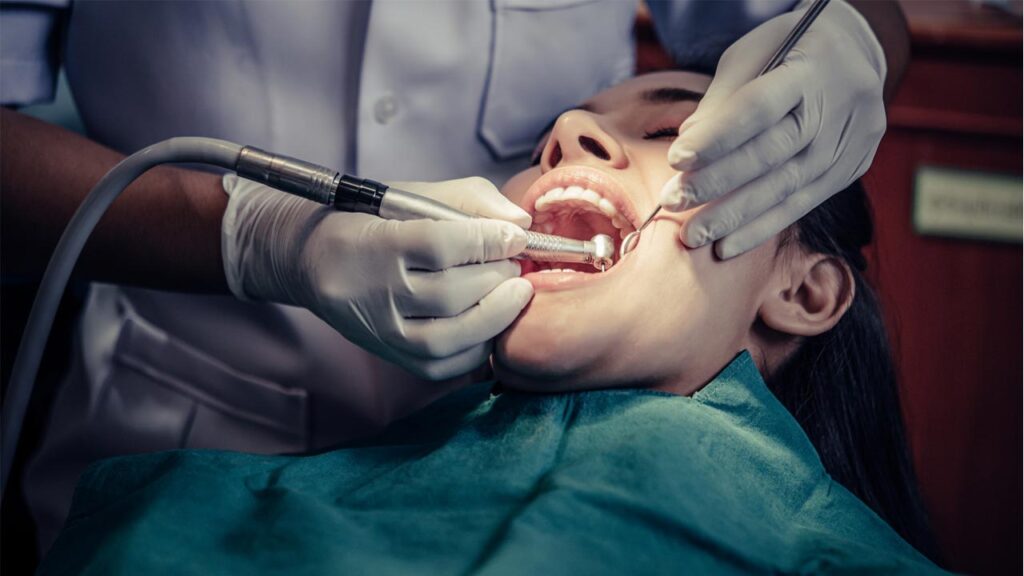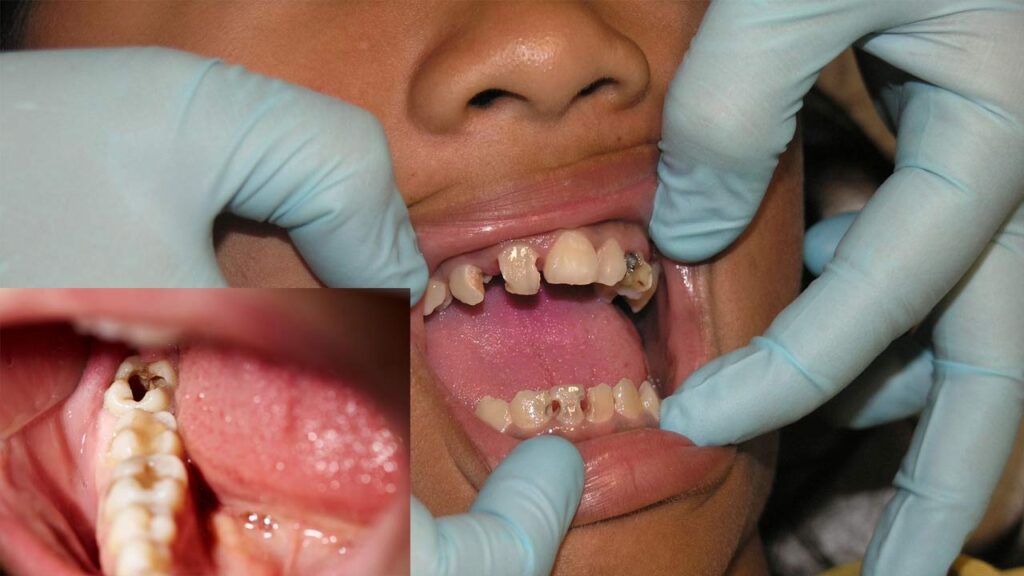Maintaining good oral health is essential for overall health and well-being. The teeth are an essential part of the mouth and play a crucial role in our daily life. However, the teeth are susceptible to damage from various factors. This article discusses the most common causes of tooth damage and the measures to prevent and treat them.
Dental Cavities
A. Explanation of what dental cavities are

Dental cavities, also known as caries, are areas of the tooth that have been damaged and decayed. They are caused by bacteria that produce acids that erode the enamel, the hard outer layer of the tooth.
B. Causes of dental cavities
The primary cause of dental cavities is the build-up of bacteria in the mouth. When bacteria combine with sugar and starch from food, they produce acid that attacks the tooth enamel, causing it to break down. Poor dental hygiene, frequent snacking, and consumption of sugary or acidic foods and drinks increase the risk of dental cavities.
C. Prevention and treatment of dental cavities
The prevention of dental cavities includes regular brushing and flossing to remove plaque and bacteria from the teeth. Reducing the intake of sugary and acidic foods and drinks and visiting the dentist regularly for check-ups and cleanings can also prevent dental cavities.
Treatment of dental cavities involves removing the decayed part of the tooth and filling the cavity with dental filling material, such as composite resin or amalgam. Severe cases may require root canal treatment or extraction of the tooth.
D. FAQ about dental cavities
Q: Can dental cavities be prevented?
A: Yes, dental cavities can be prevented by maintaining good oral hygiene, reducing the intake of sugary and acidic foods and drinks, and visiting the dentist regularly.
Q: What are the signs of a dental cavity?
A: The signs of a dental cavity include tooth sensitivity, pain, visible holes or pits in the teeth, and black or brown stains on the teeth.
Gum Disease
A. Explanation of gum disease
Gum disease, also known as periodontal disease, is an infection of the gums that can damage the tissues and bones that support the teeth. It is caused by the build-up of bacteria in the mouth that forms plaque, which can harden into tartar if not removed.
B. Causes of gum disease
The primary cause of gum disease is poor dental hygiene, which leads to the build-up of plaque and tartar. Other factors that increase the risk of gum disease include smoking, genetics, hormonal changes, and certain medications.
C. Prevention and treatment of gum disease
Prevention of gum disease involves maintaining good oral hygiene by brushing and flossing regularly, using mouthwash, and visiting the dentist for regular check-ups and cleanings.
Treatment of gum disease depends on the severity of the condition. Mild cases can be treated with deep cleaning, also known as scaling and root planning. Severe cases may require surgery, such as gum grafting or bone grafting.
D. FAQ about gum disease
Q: Is gum disease reversible?
A: Early stages of gum disease, known as gingivitis, are reversible with proper dental hygiene and treatment. However, advanced stages of gum disease, known as periodontitis, are irreversible and can cause permanent damage to the teeth and gums.
Q: Can gum disease be prevented?
A: Yes, gum disease can be prevented by maintaining good oral hygiene, reducing the intake of sugary and acidic foods and drinks, and visiting the dentist regularly.
Tooth Sensitivity
A. Explanation of tooth sensitivity
Tooth sensitivity is a common dental problem that causes pain or discomfort in the teeth when exposed to hot, cold, sweet, or acidic foods and drinks. It is caused by exposure to the tooth’s dentin, the sensitive layer of the tooth that lies beneath the enamel. The dentin can become exposed due to enamel erosion, gum recession, tooth decay, or teeth grinding.
B. Causes of tooth sensitivity
Tooth sensitivity can be caused by various factors, including:
- Enamel erosion – Enamel erosion can occur due to acidic foods and drinks, tooth decay, or brushing too hard.
- Gum recession – Gum recession can expose the tooth’s sensitive root surface, leading to tooth sensitivity.
- Tooth decay – Tooth decay can cause cavities that expose the tooth’s sensitive inner layers.
- Teeth grinding – Teeth grinding can wear down the enamel and expose the dentin, leading to tooth sensitivity.
C. Prevention and treatment of tooth sensitivity
Preventing tooth sensitivity involves maintaining good oral hygiene, reducing the intake of acidic foods and drinks, using a soft-bristled toothbrush, and avoiding teeth grinding. Desensitizing toothpaste and fluoride treatments can also help reduce tooth sensitivity.
Treatment of tooth sensitivity depends on the underlying cause. Enamel erosion and gum recession can be treated with dental restorations or gum grafting. Tooth decay can be treated with fillings or root canal therapy. Teeth grinding can be treated with a mouthguard or dental restorations.
D. FAQ about tooth sensitivity
Q: Can tooth sensitivity go away on its own?
A: Tooth sensitivity can improve on its own if the underlying cause is mild. However, it is important to seek dental treatment if the sensitivity is severe or persists for an extended period.
Q: What can I do to reduce tooth sensitivity?
A: You can reduce tooth sensitivity by maintaining good oral hygiene, using desensitizing toothpaste, avoiding acidic foods and drinks, and seeking dental treatment for underlying issues.
Teeth Grinding
A. Explanation of teeth grinding
Teeth grinding, also known as bruxism, is a condition in which a person clenches or grinds their teeth unconsciously, often during sleep. It can cause damage to the teeth, jaw, and surrounding tissues.
B. Causes of teeth grinding
Teeth grinding can be caused by various factors, including:
- Stress and anxiety – Emotional stress and anxiety can lead to teeth grinding.
- Abnormal bite – A misaligned bite or missing teeth can cause teeth grinding.
- Medications – Some medications, such as antidepressants, can cause teeth grinding as a side effect.
C. Prevention and treatment of teeth grinding
Preventing teeth grinding involves managing stress and anxiety, avoiding caffeine and alcohol, and using a mouthguard at night. Dental treatments such as bite adjustments or dental restorations can also help.
Treatment of teeth grinding depends on the underlying cause. Stress management techniques such as meditation and counselling can help reduce stress-related teeth grinding. Dental treatments such as bite adjustments, dental restorations, or orthodontics can also help alleviate teeth grinding caused by abnormal bites.
D. FAQ about teeth grinding
Q: Can teeth grind cause permanent damage to the teeth?
A: Yes, teeth grinding can cause permanent damage to the teeth if left untreated. It can cause wear and tear on the teeth, chipping, and cracking of the teeth.
Q: Can teeth grinding be cured?
A: While there is no cure for teeth grinding, it can be managed with dental treatments, stress management, and the use of a mouthguard at night.
Acidic Foods and Beverages
A. Explanation of how acidic foods and beverages can damage teeth
Acidic foods and beverages, such as citrus fruits, soft drinks, and sports drinks, can damage teeth by eroding the enamel, the hard outer layer of the tooth. This can lead to tooth sensitivity, discolouration, and cavities.
B. Examples of acidic foods and beverages
- Some common examples of acidic foods and beverages that can damage teeth include:
- Citrus fruits and juices – Oranges, lemons, limes, grapefruits, and their juices are highly acidic.
- Soft drinks – Carbonated drinks are high in sugar and acid, which can erode the enamel.
- Sports drinks – Many sports drinks are high in sugar and acid, which can damage teeth.
- Wine – Both red and white wine are acidic and can erode the enamel.
C. Prevention and treatment of acid erosion
Preventing acid erosion involves reducing the intake of acidic foods and beverages, using a straw when drinking acidic drinks, and rinsing the mouth with water after consuming acidic foods and drinks.
Treatment of acid erosion depends on the severity of the damage. Mild cases can be treated with desensitizing toothpaste or fluoride treatments. Severe cases may require dental restorations such as dental crowns or bonding.
D. FAQ about acidic foods and beverages
Q: Can I still consume acidic foods and beverages?
A: Yes, you can still consume acidic foods and beverages, but it is important to do so in moderation and practice good oral hygiene.
Q: How long after consuming acidic foods and beverages should I wait to brush my teeth?
A: It is recommended to wait at least 30 minutes after consuming acidic foods and beverages before brushing your teeth. This allows time for saliva to neutralize the acid in your mouth.
healthcareDental health is an important aspect of overall health and well-being. Take control of your dental health with our top-quality dental health care products. Say goodbye to painful and inconvenient dental issues and hello to a brighter, healthier smile.
These products are designed with the latest technology and are made from premium materials, ensuring that you get the best results. Whether you’re looking for a solution for sensitive teeth, gum health, or just want to keep your smile sparkling, our dental health care products have got you covered.
Tired of hiding your smile due to yellowing, stained, or sensitive teeth?
ProDentim is here to help. This advanced formula whitens and strengthens your teeth, while also reducing sensitivity and promoting oral health. Say goodbye to expensive and painful dental treatments, and start enjoying a bright, confident smile with ProDentim.
Click Here to Try ProDentim now and see the results for yourself!
Struggling with tooth sensitivity, gum problems or bad breath?
Dentitox Pro is the solution you need. This natural, effective formula helps to clean and strengthen your teeth and gums, giving you a brighter, healthier smile. Dentitox Pro is made with the finest ingredients and is free from harmful chemicals, making it safe and gentle for everyday use. Say goodbye to pain and embarrassment, and start enjoying a confident, beautiful smile with Dentitox Pro.
Click Here to Order now and get 20% off your first purchase!
Click Here for Professional Teeth Whitening
FAQ About What causes the most damage to teeth
Q: What is the main cause of dental cavities?
A: Dental cavities are caused by a build-up of bacteria in the mouth that produces acid that erodes the tooth enamel.
Q: How can I prevent gum disease?
A: Regular brushing and flossing, using mouthwash, and visiting the dentist regularly can help prevent gum disease.
Q: What causes tooth sensitivity?
A: Tooth sensitivity can be caused by gum recession, tooth decay, or worn tooth enamel.
Q: How can I stop grinding my teeth?
A: Stress reduction techniques, such as exercise and meditation, as well as wearing a mouthguard at night can help prevent teeth grinding.
Q: What are some acidic foods and beverages that can damage teeth?
A: Examples of acidic foods and beverages include citrus fruits, soda, and coffee.
Q: How often should I visit the dentist for a check-up?
A: It is recommended to visit the dentist every six months for a check-up and cleaning.
In conclusion, the main causes of tooth damage include dental cavities, gum disease, tooth sensitivity, teeth grinding, and acidic foods and beverages. Maintaining good dental hygiene and regular dental check-ups can help prevent and treat tooth damage.
It is important to brush twice a day, floss daily, and visit the dentist regularly. Tooth damage can be prevented or treated with proper dental care and early detection. It is important to address any dental problems promptly to avoid more serious issues down the line.


1 thought on “What causes the most damage to teeth?”